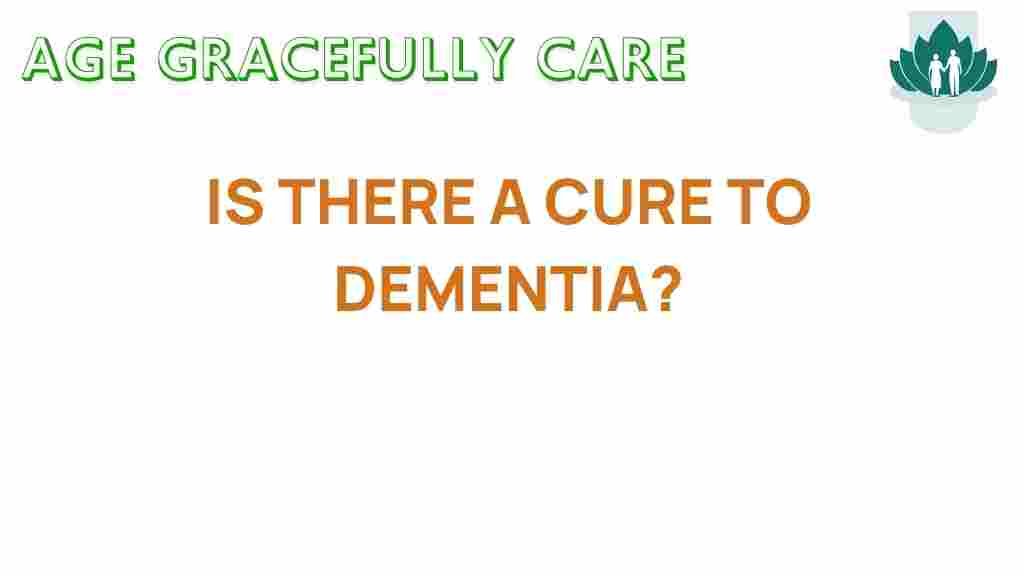Is a Cure for Dementia on the Horizon? Exploring New Breakthroughs
Dementia is a complex and challenging condition that affects millions of people worldwide, particularly as they age. As our understanding of brain health and aging evolves, researchers are making significant strides in the fight against dementia. Various breakthroughs in neuroscience and innovative treatments are emerging, raising the question: is a cure for dementia on the horizon? In this article, we will delve into the latest research, examine promising treatments, and explore the potential future of dementia care.
Understanding Dementia and Its Impact
Dementia is an umbrella term for a range of neurological disorders, with Alzheimer’s disease being the most common form. The condition is characterized by cognitive decline, memory loss, and a decrease in the ability to perform everyday activities. According to the World Health Organization, around 55 million people are living with dementia, and this number is expected to increase significantly as the global population ages.
The Need for a Cure
The search for a dementia cure is critical for several reasons:
- Increasing Prevalence: The aging population is leading to a rise in dementia cases, creating a growing healthcare burden.
- Quality of Life: Dementia severely impacts the quality of life for patients and their families.
- Economic Costs: The financial implications of dementia care are staggering, with billions spent annually on treatment and support.
Recent Breakthroughs in Dementia Research
Recent advancements in neuroscience have provided hope in the quest for a dementia cure. Researchers are exploring various avenues, including:
- Biomarkers: Identifying biomarkers related to dementia can help in early diagnosis and monitoring disease progression.
- Genetic Research: Understanding genetic factors associated with dementia can pave the way for personalized treatment options.
- Neuroinflammation: Investigating the role of inflammation in the brain may lead to new therapeutic strategies.
- Neurogenesis: Stimulating the creation of new neurons in the brain could potentially restore cognitive function.
Promising Treatments on the Horizon
Several innovative treatments are currently being investigated, which may lead to breakthroughs in dementia care:
1. Disease-Modifying Therapies
These therapies aim to slow down or halt the progression of dementia rather than merely alleviating symptoms. Some of the most promising drug candidates include:
- Aducanumab: This medication targets amyloid plaques in the brain, which are associated with Alzheimer’s disease. Clinical trials have shown mixed results, but it represents a new approach to treatment.
- Lecanemab: Another drug that targets amyloid, Lecanemab has shown promise in slowing cognitive decline in clinical trials.
2. Immunotherapy
Immunotherapy is a treatment strategy that uses the body’s immune system to fight disease. In the case of dementia, researchers are exploring ways to enhance the immune response against toxic proteins that accumulate in the brains of individuals with Alzheimer’s.
3. Lifestyle Interventions
Research has increasingly shown that lifestyle factors can influence brain health. Interventions such as:
- Regular Exercise: Physical activity has been associated with a reduced risk of developing dementia.
- Healthy Diet: Diets rich in antioxidants, omega-3 fatty acids, and whole grains may protect against cognitive decline.
- Cognitive Training: Engaging in mentally stimulating activities may help maintain cognitive function.
Exploring the Role of Technology
Technology is playing an increasingly vital role in dementia research and treatment. Innovations such as:
- Wearable Devices: These can monitor health metrics and provide data for research on cognitive decline.
- Telehealth: Remote consultations can improve access to care for individuals with dementia and their families.
- Artificial Intelligence: AI systems can analyze vast amounts of data to identify patterns and predict disease progression.
Challenges in Dementia Research
Despite the promising breakthroughs, several challenges remain in dementia research:
- Complexity of the Disease: Dementia is not a single condition but a spectrum of disorders, making it difficult to find a one-size-fits-all solution.
- Funding and Resources: Adequate funding for research is crucial to accelerate the discovery of effective treatments.
- Public Awareness: Increasing awareness and understanding of dementia can help foster support for ongoing research.
Tips for Caregivers and Families
Caring for a loved one with dementia can be challenging. Here are some tips for caregivers:
- Educate Yourself: Understanding the condition can help you provide better care and support.
- Establish Routines: Familiar routines can help reduce confusion and anxiety for individuals with dementia.
- Seek Support: Don’t hesitate to reach out to support groups or professional services for help.
Looking Ahead: The Future of Dementia Treatment
As research continues, the future of dementia treatment looks promising. Here are some potential directions:
- Personalized Medicine: Tailoring treatments based on individual genetic and lifestyle factors may improve outcomes.
- Holistic Approaches: Combining medical treatment with lifestyle changes may enhance brain health.
- Greater Collaboration: Increased collaboration between researchers, healthcare professionals, and families can lead to more effective strategies.
Conclusion
While a definitive cure for dementia remains elusive, the landscape of research and treatment is evolving rapidly. Breakthroughs in neuroscience, innovative therapies, and a better understanding of brain health are paving the way for a brighter future. As we continue to explore these promising avenues, the hope for effective dementia treatments grows stronger. By staying informed and supporting ongoing research, we can contribute to the fight against dementia and improve the lives of millions affected by this condition.
For more information on dementia research and support, consider visiting the Alzheimer’s Association for resources and updates. Additionally, you can learn more about the latest breakthroughs in neuroscience by checking out this informative article.
This article is in the category Health and created by AgeGracefullyCare Team
